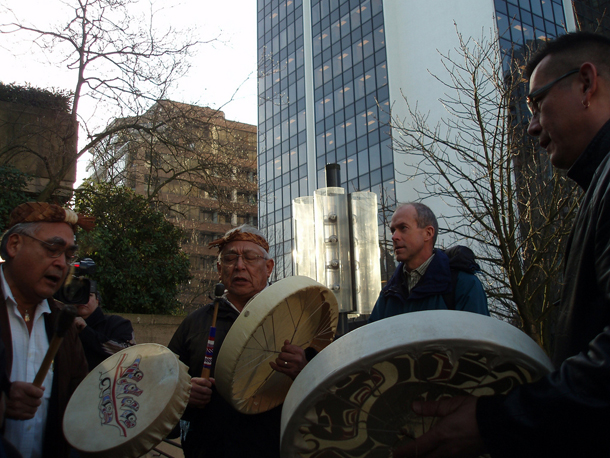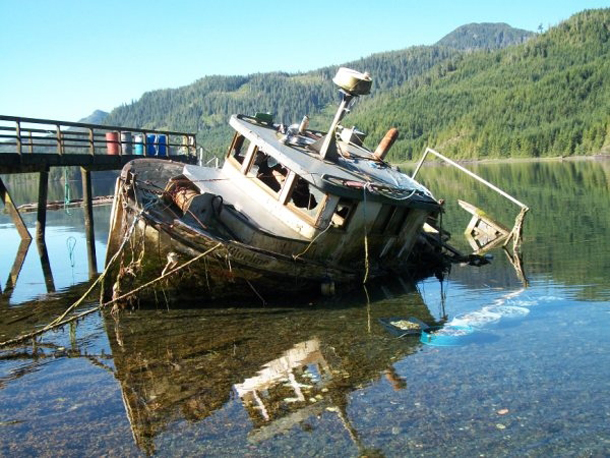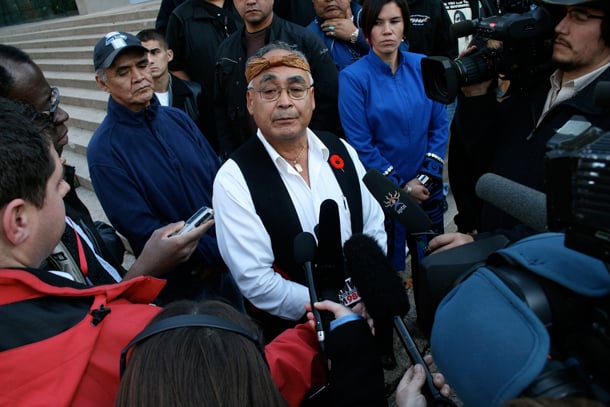Before the Canadian press beamed pictures of Attawapiskat into our living rooms, five First Nations on Vancouver Island's west coast were fighting to raise their communities' substandard living conditions by regaining access to commercial fishing. These nations took Canada to court to rebuild an economy broken by colonization.
The result? Both the BC Supreme Court and the BC Court of Appeal handed them victories in 2009 and 2011, recognizing their right to sell fish (and Canada's infringement of that right). Yet so far Canada has ignored the courts' directions, while the people in Nuu-chah-nulth communities live in poverty.
In December, the Assembly of First Nations voted to intervene in the court case (known officially as Ahousaht et al vs. Canada) if the Supreme Court of Canada decides to hear Canada's appeal of the Nuu-chah-nulth victory. The Union of BC Indian Chiefs and the First Nations Summit adopted similar resolutions.
It's a case with the potential to put at least five of Canada's First Nations back on the road to self-sufficiency and replace a history of government dependency. So why does the Government of Canada refuse to recognize the previous decisions?
That's a question many First Nations stopped asking long ago, because they already know the answer. For them, overcrowded houses and black mold are just more evidence that Canadian control of their lands and resources will never allow their people to rise above the aboriginal status quo. For the Nuu-chah-nulth Nations involved, Ahousaht et al vs. Canada is the latest in a string of missed opportunities by Canada to demonstrate real reconciliation with First Nations.
A fishing people
Long before Captain Cook set foot on the shores of Nootka Island in 1778, Nuu-chah-nulth Nations had a sophisticated system of economic trade that included fish and other seafood. When Canada assumed control of Nuu-chah-nulth territories, government agents confined Nuu-chah-nulth to small reservations with the understanding that they were a fishing people and not dependent on the land for survival. No treaty or informal handshake spelled out the details of a future that would see their grandchildren arrested for selling fish. Instead, they continued to catch, trade, and sell seafood through community-based fisheries ruled by small boats and sustainable livelihoods.
"When I was growing up over 50 years ago, every family in Ahousaht was independent," says Cliff Atleo, referring to one of 14 Nuu-chah-nulth Nations located on Canada's remote west coast. Now president of the Nuu-chah-nulth Tribal Council, Atleo is also uncle to the Assembly of First Nations' National Chief, Shawn Atleo. "I started fishing from a canoe, and by the time I was 13, my parents no longer had to give me a dime."
Then came changes to Canada's fisheries policy in the 1970s, '80s and '90s, which limited small-boat fishing in favour of an integrated, industrial model. Big boats, big nets, and big costs were now the norm. A series of new regulations also determined who could keep those licences and who couldn't.
"In 1969, Canada started 'rationalizing' the fleet. Part of this was based on fiscal earnings. If you didn't earn enough, your licence faded away... In 1977 and '78, they required 3,000 pounds of landed halibut to retain licences. Many of our guys had 1500, 2000 lbs, but it wasn't enough," Atleo says.
Unable to afford the sizable licences, gear, and vessels required by the new fisheries, Nuu-chah-nulth fishermen and communities lost access to their seafood economy.
The conflict years
For some, this economy went underground and resulted in gunpoint standoffs and hand-cuffed parents dragged from rivers in the dead of night. For others, a fishing livelihood became something from the past, like communal living and cedar tunics. Still others clung to the idea that even the Canadian government could be reasonable under the right circumstances. Between 1985 and 2006, Nuu-chah-nulth Nations put forward proposals to "licence split" larger licences into smaller ones.
To be clear, licence splitting doesn't mean more people catching more fish. It means more people catching the same amount of fish, so the benefits reach more people. In the Nuu-chah-nulth proposals, licence splitting also equalled community-based fisheries, often from smaller boats that reduce harm to the environment. While Canada's regulations (under the Aboriginal Communal Licensing Regulations) could permit community-based fishing of this sort, Canada has consistently refused to do so.
"Canada did permit one Aboriginal fishery on the Somass River," says tribal council fisheries manager, Don Hall, referring to a pilot sales agreement that began in the late 1990s. "Each year this creates opportunities for over a hundred people in Port Alberni. The same amount of fish could easily be harvested by one seine boat in a few days of fishing."
Employed by the nations since 1992, Hall wonders why Canada never extended this opportunity to other nations. He's not the only one. When treaties and other negotiations failed to put boats back on the water, Nuu-chah-nulth Nations took Canada (and British Columbia) to court.
What they wanted was recognition of their Aboriginal right to fish and sell fish. They also wanted acknowledgment that Canada was wrong to stop them from fishing "Nuu-chah-nulth style." After 123 days in court, they got both.

"There were grown men crying from relief and joy in the courtroom that day," Hall says. "Some of them had seen their parents arrested for fishing."
Others understood their children would not suffer the same grinding poverty they had faced, while fishing boats owned by B.C. millionaires like Jimmy Pattison fished their ancestral waters. The judge gave the parties two years to design a fishery based on the newly recognized right.
'Glacial' negotiations
From the beginning, negotiations between the nations and Canada have moved at a glacial pace. Some would argue they haven't begun. "Don't let anyone tell you there has been any negotiating. There hasn't," Atleo says. "Our ability to go out fishing tomorrow is there -- and it's not on a scale that would threaten anyone. But there's a blockage in their way of thinking."
Instead of responding to Nuu-chah-nulth proposals or generating new ideas, Canada has offered slim opportunities with regular commercial licences. These licences come with the same restrictions previously deemed insufficient by both the BC Supreme Court and the Court of Appeal.
In one example, Canada's offer would require a monitoring system costing more than $45,000 per boat, per year, even though most of the Nuu-chah-nulth boats are the same size as those active in the sport fishery, where no monitoring is required. Those costs would negate any revenue made by the meagre offer.
Says Atleo: "It has been two years plus, and we haven't gone fishing yet... All we have is a proposal and an offer from DFO that is insulting when you read the court decision."
Concurrent to these negotiations, Canada has appealed the decision to the Supreme Court of Canada. Nations believe this directive came from the Prime Minister's office, and not from the local Pacific Region where fisheries managers seem equally tired of the standoff. If they are right, the Conservative government is sorely out of step with local opinion. In a public perception audit conducted in late 2010 by the First Nations Fisheries Council, 87 per cent of those surveyed support fishing by First Nations for food and ceremony. Sixty-nine per cent of those supported First Nations right to a commercial fishery.

"It's very telling in many ways," says Atleo, summing up the Harper government's response to Attawapiskat, Ahousaht, and other issues. "Canada has never acknowledged First Nations as the original owners and occupiers of this land. They constantly display ignorance of our people and our way of life -- and they choose not to learn ways that could make things better for us to work together... They also have no appreciation for the reality that they survived here because of our help. They have never recognized us and still don't."
Until that happens, Atleo believes, nothing is going to change -- an unfortunate reality for all Canadians, who are finally ready to see change happen. ![]()
Read more: Indigenous, Rights + Justice















Tyee Commenting Guidelines
Comments that violate guidelines risk being deleted, and violations may result in a temporary or permanent user ban. Maintain the spirit of good conversation to stay in the discussion.
*Please note The Tyee is not a forum for spreading misinformation about COVID-19, denying its existence or minimizing its risk to public health.
Do:
Do not: